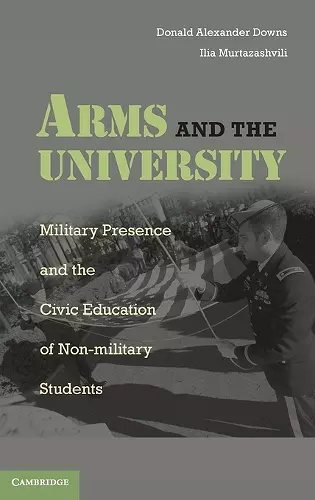Arms and the University
Military Presence and the Civic Education of Non-Military Students
Donald Alexander Downs author Ilia Murtazashvili author
Format:Hardback
Publisher:Cambridge University Press
Published:27th Feb '12
Currently unavailable, and unfortunately no date known when it will be back
This hardback is available in another edition too:
- Paperback£30.99(9780521156707)

Demonstrates how some military presence on campus can contribute to the diversity of ideas and the education of all students.
Arms and the University probes various dimensions of the tense relationship between the military and the university. Developing and applying a theory of civic and liberal education, this book shows how some military presence on campus can contribute to the diversity of ideas and the education of all students.Alienation between the U.S. military and society has grown in recent decades. Such alienation is unhealthy, as it threatens both sufficient civilian control of the military and the long-standing ideal of the 'citizen soldier'. Nowhere is this issue more predominant than at many major universities, which began turning their backs on the military during the chaotic years of the Vietnam War. Arms and the University probes various dimensions of this alienation, as well as recent efforts to restore a closer relationship between the military and the university. Through theoretical and empirical analysis, Donald Alexander Downs and Ilia Murtazashvili show how a military presence on campus in the form of ROTC (including a case study of ROTC's return to Columbia and Harvard universities), military history and national security studies can enhance the civic and liberal education of non-military students, and in the process help to bridge the civil-military gap.
"Distrust or disdain for ‘the military’ may foster one’s isolation from those more familiar with it, and lead to mutual misunderstanding. Utilizing relevant political theory and sound empirical evidence, Downs and Murtazashvili demonstrate that the university’s role in providing civic and liberal education is fostered, rather than injured, by enabling members of ROTC units and student veterans to interact with other students in classrooms (and cafeterias). They note cogently that ignorance of military institutions and wars impede students and potential future policymakers from grasping strategic limits in crises. A long overdue case for the return of ROTC to those campuses that exiled them over a generation ago, as well as a good brief for the teaching of military history." —Peter Karsten, University of Pittsburgh, author of Law, Soldiers & Combat
"Arms and the University provides the best look at the critical topic of the American military on campus currently in print. It also gets to the heart of the issue of how democracies learn to co-exist with the often undemocratic institutions that defend them. This book illuminates the tensions, the cooperation, and the conflicts inherent in an unusual relationship. It is a must-read for those who want to learn more about how we as a society educate and defend ourselves." —Michael S. Neiberg, author of Making Citizen-Soldiers
"Downs and Murtazashvili offer a thoughtful analysis of the inherent tensions that exist in the military’s involvement in American universities. They make a strong case for keeping military history and the study of international security issues part of the diversity of ideas that they believe necessarily underlie both an effective civic education and a truly liberal education." —Harvey M. Sapolsky, Massachusetts Institute of Technology, emeritus
"Anyone who visits the nation's major universities observes the ubiquity of athletics and the absence of the military. Although the United States has been at war for a decade, our universities have largely avoided any serious discussion of the subject. Arms and the University explains the sources of military exclusion on many campuses, and it examines the intellectual and policy ramifications. The authors make an eloquent case for liberal education and the vital role that military perspectives must play, along with non-military points of view, in a free marketplace of ideas. Every citizen who cares about contemporary foreign policy, civil-military relations, and the health of democracy should read this urgent book." —Jeremi Suri, University of Texas, Austin, author of Liberty's Surest Guardian: American Nation-Building from the Founders to Obama
ISBN: 9780521192323
Dimensions: 241mm x 161mm x 25mm
Weight: 760g
456 pages